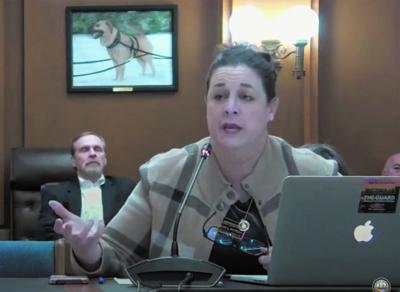CONCORD — The House Environmental and Agriculture Committee heard testimony on House Bill 707, a scathing indictment of the New Hampshire Department of Environmental Services for ignoring legislative intent as it updated rules governing solid waste landfills in the state.
The committee took testimony on Feb. 4, and planned to discuss the bill in further detail during committee meetings this month, but due to time constraints, ultimately postponed that discussion to Tuesday, March 4.
Opening the testimony during the Feb. 4 public hearing, Rep. Kelley Potenza (R-Rochester), lead bill sponsor, said, “The bills that have been filed over the last five to six years clearly state what the Legislature has been trying to do,” yet the draft rules developed by DES in March 2024 were “the weakest in the world. It allowed pollution to move at 3 feet per day, whereas most states and countries restrict it to a couple of feet per year. But then, long after public comments ended, the DES added a gravely dangerous sentence to the rules, which eliminates even that weakest-in-the-world test, and allows a landfill to be built anywhere in the state, as long as there’s 24 inches of imported dirt under it. That sentence explicitly allows the dirt to transmit pollution at 3 inches per day, which of course, is eight days to go through 24 inches of soil.”
HB 707 has 14 co-sponsors, seven from each party. The legislative consensus over the past few years has been that solid waste permitting should be site-specific, taking into account the unique characteristics of the soil, proximity to bodies of water, and impact on the environment. Public testimony has overwhelmingly supported strict safeguards.
Potenza’s bill calls for a setback from a water body that “should be sufficient to prevent groundwater contaminated by a leak, spill, or other failure from reaching the waterbody before remedial action can be implemented. A period of 5 years should be sufficient to detect and map a failure, assess appropriate remediation, meet engineering and regulatory requirements, and initiate the remedy.”
It was opposition to Casella Waste Systems’ proposed landfill near Forest Lake State Park in Dalton that brought the matter to lawmakers’ attention. After both chambers passed a bill to strengthen environmental protections to prevent landfill pollution, former Gov. Chris Sununu vetoed the bill. Gov. Kelly Ayotte has taken the opposite stance.
“When we talk about solid waste, the governor has strongly signaled her opposition to the Dalton project,” Potenza said. “But the rules, and this is the most important thing, it’s not about one project right now. The rules will allow a landfill to be put pretty much anywhere. So if the rules are not rewritten, some company could come in, come to Nashua, could come to Keene, Concord, wherever, and find another terrible tract of land and claim that the rules entitle them to build there.”
Potenza said the only person who had sent opposing testimony “is a paid contractor for the industry that is working on the only permit that is in DES’ office.”
Among those submitting written testimony on the bill was Adam Finkel of Dalton. He wrote, “I have 91-A [public record request] responses revealing that DES weakened the rules further 4 different times, each time after privately meeting with industry. I defy DES to deny the charge that they REVERSE-ENGINEERED the rules specifically to greenlight one project (the GSL in Dalton/Bethlehem) that could not possibly pass any of the other hydrogeologic criteria set by any other state, province, or country in the world. This is no different from a state transportation department setting a 200 mph speed limit on all state highways merely because one friend of theirs is a race car driver who asked to be allowed to drive that fast.”
Casella’s landfill in Bethlehem, which is scheduled for closure, has had a number of permit violations, including the largest leachate spill in state history. Documents from the company revealed it took 10 years to discover a tear in the liner which had occurred during initial construction of the landfill.
During discussion on HB 707, Rep. Molly Howard (D-Hancock) recounted that, last session, lawmakers tried to fashion legislation that would be as prescriptive as possible, “and there was sort of a promise made to us that we didn’t need to legislate it, because the rules were going to be comprehensive and updated and all of that, and this seems like another attempt.
"And I’m just wondering, are we going to get the same pushback about rules versus legislation that we got last time?”
Wayne Morrison, president of the North Country Alliance for Balanced Change, said, “I’m a homeowner. I’m not a hydrogeologist, but over the last six years, I’ve hired a hydrogeologist, I’ve hired a lawyer, I’ve hired a wetlands expert. I’ve invested my time and my energy to try and defend what I think is the best interest not only of my own property, but my neighbors’, and ultimately, the people of New Hampshire. I’ve come to realize that siting a landfill is probably the single most important decision in that project’s life.”
He continued, “There’s a ton of engineering and there’s a lot of complexity in the engineering part of the landfill, and you’ll hear a lot about double liners and monitoring wells; but where you put one of these ultimately dictates the risks that you’re putting people in New Hampshire under, and that risk is not for a week or a month or a year, or even the life of the permit, which is, say, 20 years. It’s at risk for the next 100 years, because even after the landfill closes, the risks continue.”
Recalling his reaction when he heard the Dalton landfill could be sited 200 feet from water’s edge, Morrison said, “Two-thirds of a football field is not the protection I’m looking for, and not just from my site, but anywhere. After a number of iterations, conversations, a year of rules being reviewed, feedback being given, that rule today is 500 feet, and that’s if the river is big enough.
"As Gov. Ayotte said when she came and visited Forest Lake, she said, ‘This makes no sense.’ That comment resonates with me, because I think it makes no sense.”
The current draft of the bill has some provisions Potenza said she will amend after speaking with those in the industry. “There’s a couple places in here where I’d say that I got a little aggressive, and those are up for some changes.”
Michael Wimsatt, director of the DES’ Solid Waste Bureau, also suggested some “technical” changes in the bill’s language, prefacing his remarks with his usual disclaimer the department is not taking a position on the bill itself.
He cited several locations where the term “potable water aquifer” is used. “Everybody has a different idea what an aquifer is,” he said. “For some people, an aquifer is the Ogallala Aquifer in the Midwest that covers several states and provides water to thousands of people. But the hydrogeologist definition of an aquifer is very broad, and basically means any water-bearing formation that can provide water to a user, and that user could be an individual home well.
"So almost any landfill siting is likely to overlie something you could with that definition define as an aquifer.”
The bill also states that it applies only to new landfills, exempting existing facilities. Wimsatt said, “It’s not clear to the department why the members of a community where a facility exists deserve less protective conditions than the members of the community where a new facility is being proposed.”
Another section uses the term “fully permitted” which Wimsatt explained could pose a problem. The bureau administers the solid waste program through a system of permits, and “virtually any change you make or any new advancement at a landfill, there’s a new permit modification that needs to happen. So it could be read that, if the desire of the bill is to expand those facilities, an expansion that’s been approved at a landfill is not really fully permitted until it’s approved for construction and it’s given operational approval, and that happens very late in the game.”
In written testimony, there were 12 in favor of the bill’s passage and one opposed.
Editor's note: This story has been updated to clarify Rep. Kelley Potenza is a Republican from Rochester.


















(0) comments
Welcome to the discussion.
Log In
Keep it Clean. Please avoid obscene, vulgar, lewd, racist or sexually-oriented language.
PLEASE TURN OFF YOUR CAPS LOCK.
Don't Threaten. Threats of harming another person will not be tolerated.
Be Truthful. Don't knowingly lie about anyone or anything.
Be Nice. No racism, sexism or any sort of -ism that is degrading to another person.
Be Proactive. Use the 'Report' link on each comment to let us know of abusive posts.
Share with Us. We'd love to hear eyewitness accounts, the history behind an article.